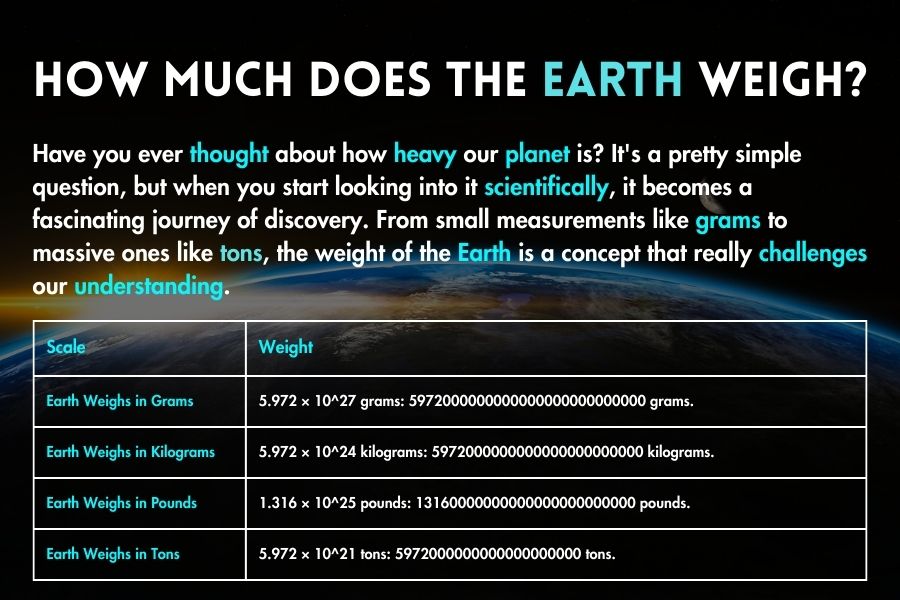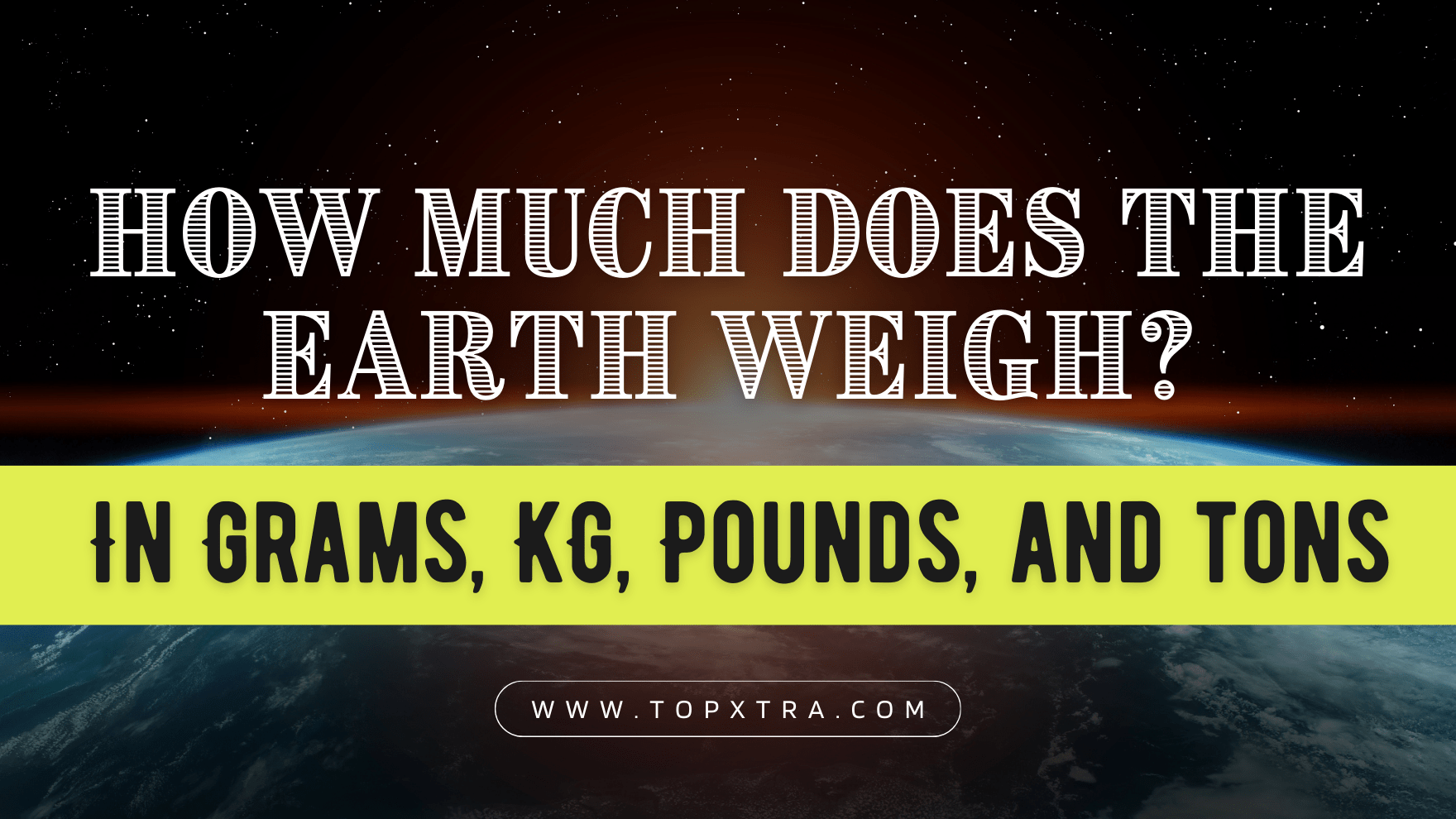Earth Weigh! Humans have been on a quest to understand the weight of the Earth. We’ve explored physics and astronomy to grasp the enormity of our planet. We’ve measured it in different units like grams, kilograms, pounds, and tons to make sense of it. The Earth’s weight is astonishing, influencing everything from the oceans to the moon’s movements. Let’s explore the numbers and discover the weight of our home without borrowing from others.
You can’t imagine how much the earth weighs. Because it’s not easy to write with zero. Let’s take a short look at how the earth weighs on different scales, like grams, kg, pounds, and tons.
How Much Does the Earth Weigh?
Have you ever pondered the mass of our planet? It’s a seemingly straightforward question, yet delving into scientific inquiry reveals a captivating voyage of exploration and revelation. Ranging from grams to tons, the Earth’s weight stands as a concept that pushes the limits of our comprehension.
Breaking Down the Numbers
Understanding the Earth’s weight requires us to simplify it into more manageable units. Let’s begin with the smaller ones: grams and kilograms. Scientific estimates suggest that the Earth weighs around 5.972 × 10^24 kilograms, equivalent to approximately 5.972 × 10^27 grams. This vast number serves as a testament to the sheer enormity of our planet.
As we transition to larger units like pounds and tons, we encounter figures that are more relatable to many. In pounds, the Earth’s weight is estimated to be roughly 1.316 × 10^25 pounds. Converted to tons, this amounts to a staggering 5.972 × 10^21 tons. Although these numbers may initially seem overwhelming, they highlight the immense magnitude of our world.
| Scale | Weight |
|---|---|
| Earth Weighs in Grams | 5.972 × 10^27 grams: 5972000000000000000000000000 grams. |
| Earth Weighs in Kilograms | 5.972 × 10^24 kilograms: 5972000000000000000000000 kilograms. |
| Earth Weighs in Pounds | 1.316 × 10^25 pounds: 13160000000000000000000000 pounds. |
| Earth Weighs in Tons | 5.972 × 10^21 tons: 5972000000000000000000 tons. |
The Earth has a mass of 5,970,000,000,000,000,000,000,000 kg.
Facts about the Earth
∴ It is the third planet from our sun.
∴ Earth’s diameter is about 13000km!
∴ Earth isn’t really round. Its spin causes the poles to be a bit squashed and the middle to be swollen.
∴ Over 70% of the Earth’s surface is water!
∴ Earth is not even the heaviest planet in our solar system. Jupiter is much heavier than Earth. In fact, Jupiter equals about 318 Earths.
Why the Earth is So Heavy?
The weight of the Earth is primarily due to its mass, which is a measure of the amount of matter it contains. The Earth’s mass is influenced by several factors, including its composition and size.
- Composition: The Earth is composed of various materials, including rock, metal, water, and gases. These substances contribute to its overall mass. For example, the dense metallic core of iron and nickel accounts for a significant portion of the Earth’s weight.
- Size: The Earth is the largest terrestrial planet in our solar system, with a diameter of about 12,742 kilometers (7,918 miles) and a circumference of roughly 40,075 kilometers (24,901 miles). Its substantial size adds to its massiveness and consequently, its weight.
To calculate the Earth’s weight, we use the formula:
Where:
- Mass is the amount of matter in the Earth, typically measured in kilograms.
- Gravity is the gravitational acceleration acting on the Earth’s mass, approximately 9.8 m/s2.
Using this formula, we can determine the Earth’s weight. For example, if we take the Earth’s mass as 5.972×1024 kilograms:
Weight = (5.972×1024 kg)×(9.8 m/s2)
Weight ≈ 5.845×1025 N (Newtons)
This calculation illustrates that the Earth’s weight is a result of its substantial mass and the gravitational force exerted on it.
Related Topics:
- How Much Does a Horse Weigh?
- How Much Does a Eagle Weigh?
- 10 Heavy Whales in the World
- How Much Does a Baseball Weigh?
- How Much Does a Lion Weigh?
The Weigh of Other Planets
in KG, Pounds, Tons, and Grams
| Planet | Mass (kg) | Mass (lb) | Mass (g) | Mass (t) |
|---|---|---|---|---|
| Mercury | 3.285 × 10^23 | 7.25 × 10^23 | 3.285 × 10^26 | 3.285 × 10^20 |
| Venus | 4.867 × 10^24 | 1.072 × 10^25 | 4.867 × 10^27 | 4.867 × 10^21 |
| Earth | 5.972 × 10^24 | 1.316 × 10^25 | 5.972 × 10^27 | 5.972 × 10^21 |
| Mars | 6.39 × 10^23 | 1.409 × 10^24 | 6.39 × 10^26 | 6.39 × 10^20 |
| Jupiter | 1.898 × 10^27 | 4.185 × 10^27 | 1.898 × 10^30 | 1.898 × 10^24 |
| Saturn | 5.683 × 10^26 | 1.253 × 10^27 | 5.683 × 10^29 | 5.683 × 10^23 |
| Uranus | 8.681 × 10^25 | 1.914 × 10^26 | 8.681 × 10^28 | 8.681 × 10^22 |
| Neptune | 1.024 × 10^26 | 2.258 × 10^26 | 1.024 × 10^29 | 1.024 × 10^23 |


